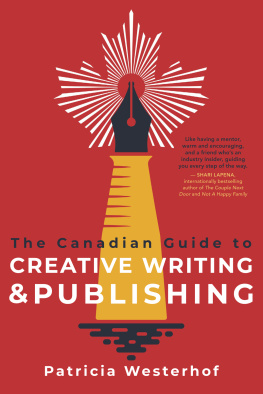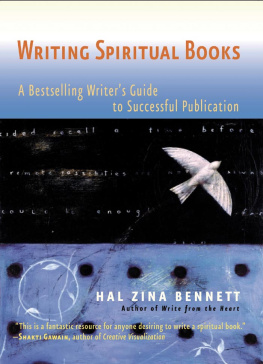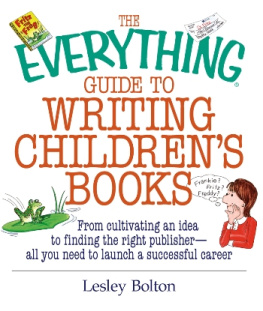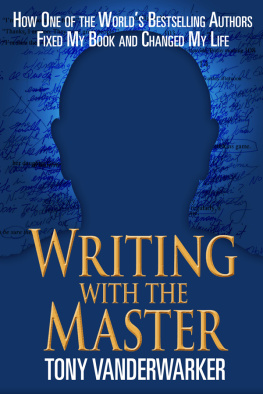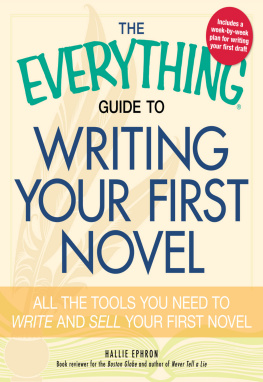ALSO BY ZANE
Addicted
Shame on It All
The Heat Seekers
The Sex Chronicles: Shattering the Myth
Gettin Buck Wild: The Sex Chronicles II
The Sisters of APF
Nervous
Skyscraper
Afterburn
Love is Never Painless
Dear G-Spot: Straight Talk About Sex and Love
Zanes The Sex Chronicles
Total Eclipse of the Heart
The Hot Box
Everything Fades Away
Ill Be Home for Christmas
The Other Side of the Pillow
CHAPTER 1
Discipline
Forming Your Writing Habits
Finding the time to write can be a major factor in the lives of most aspiring writers with other careers and responsibilities. Even for those of us who are full-time, successful writers, it can still be a painstaking chore to lock ourselves away with a pen, pad, or a laptop to embrace our passion. I say passion because it goes hand in hand with discipline. It comes down to how bad you want to be able to complete a manuscript. While there is no surefire method to the madness that brings about much reward, I have a few suggestions.
First and foremost, do not panic over it. That will solve nothing and will only set you back in your efforts. Even if you have a book under contract and the publisher has established a deadline, you should not feel compelled to turn in something that is not what you consider your best effort. Speak up in the beginning if you do not feel like you can make an established deadline. The publisher can push the date back or, if there is space in the timeline, allow you some extra time.
I am also a publisher, and heres an example: this morning an agent called me and asked if her author could turn in her manuscript in February of next year instead of November of this year. I agreed immediately and amended the paperwork. I do not want my authors to feel like turning in a rough draft is acceptable. I will discuss that in more depth in another chapter. Stressing yourself out is the least effective way to complete a well-written book.
Secondly, be realistic about how often you can write and your writing speed. Some people write a page a day. Others write ten thousand words a day. Most writers fall somewhere in between anywhere in between. Then there are those that may write for a couple of weeks, take a couple of months or even a couple of years off, and then write for another couple of weeks. It all depends.
However, I am an avid believer that if you want to truly be a writer, you will do it daily so that it becomes routine, like brushing your teeth. Even if you have writers block, it is imperative that you keep the habit up. Write about another topic instead of the one you are stuck onwhatever comes to mind. If you keep it real with yourself about your abilities, then all the pressure floats away.
Thirdly, you need to test different places and times of day to see when you are most effective. Some people write better in the middle of an Internet caf, Starbucks, or the dining section of their local grocery store. They like background noise and are inspired by observing people going about their day. Others still feel the power in numbers but noise irritates them, so they may write in the quiet room of the local library. Then there are the loners. The writers that prefer total isolation so they can immerse themselves in their imaginations. They may have some background noise like the television or listen to some music. Some even have particular songs that motivate them to keep going. I have done all of the above at one time or another. My needs vary so I mix it up. However, if I had to pick one way to write, it would be with music. I have written some books and listened to the same theme song practically the entire time that it took to complete them. You need to experiment with different things and see what works best for you.
The biggest key to discipline as a writer is time management. You can find the opportunity to do it by tweaking some of the other things you waste time on. When I first started writing, I was working a full-time, stressful career. However, I made the commitment to spend at least four hours per day working on my passion after spending eight to ten hours a day working on someone elses passion. Instead of hanging out at happy hours after work with coworkers, watching television for several hours, or talking on the phone, I entertained myself with my mind. And the funny part is that when I was doing it from 1997 to 1999, the thought never crossed my mind about actually publishing anything. I would have continued writing, even if that decision was never made.
Also, writing comes easier with a clear head. I would suggest working outeven if its just walkingprior to writing, or possibly going for a drive, doing a jigsaw puzzle, logic puzzles, or even washing dishes. Whatever works for you personally. Journaling is a great thing as well. Writing down all of your personal concerns in a journal and then leaving it all there frees you up to explore something better or more interesting. There is a great free website called penzu.com that will provide you with a password-protected journal that you can access from anywhere. A lot of people are apprehensive about keeping a hard copy journal because their privacy can be so easily violated. I have had that experience and it was not pleasant. However, the beauty of journaling is that you can go back years, even decades later, and witness where you were in that space and time. Sometimes it renews your beliefs and reminds you how special you are. Other times it shows you how far you have come and how much you have matured. And yes, there are those times when you read your old journals and wonder what the hell you were thinking. Memories are all valuable, positive or negative. The site will even send you a daily reminder email that it is time to write and you can take that as your cue to journal or work on your book. Even if you do not do that, set an alarm to go off on your cell phone to let you know when it is writing time.
Always have something handy to write with, whether it is a tablet, phone, pen and pad, or computer. Even the most prolific writers come up with incredible ideas and then cannot remember them later if they do not write them down. I am still trying to remember what I considered to be the perfect book title a couple of years later. I hope it comes back to me one day because I regret not writing it down. You will have to learn how to zone the rest of the world out when necessary. In todays society, there are even more distractions than there were a decade ago. But I contend that if you want something bad enough, you will do whatever it takes, even if you have to think outside of the box. Most people do not have endless leisure time because of work and family responsibilities, but you will have to hold yourself accountable to make the time to write. Like all habitsbad or goodonce you establish one it is easier to keep going and harder to break it.
Developing a Mind-set
When I first began to write, it was not with the intention of becoming published. It was a creative outlet for me. I gave away my musings for free over the Internet for more than three years. Other people began to enjoy my work, but if no one ever had, I still would have continued to write and share. Ive now written and published more books than I can count, but truth be told, the majority of the things that I have written still remain unpublished and might very well stay that way. Some are incomplete novels, others are short stories in which I was simply venting about something bothering me. A lot of the writing Ive done is in the form of personal journal entries about my life. So not everything I write will have its moment in the sun.
This is the same for most writers. Ive read thousands of books, manuscripts, and screenplays in my role as publisher and acquiring editor for my imprint, Strebor Books. Unlike a lot of authors who are constantly in full battle gear and act like we are all gladiators in an arena, I thrive from helping other writers achieve their goals. Can I help everyone? No. Do I even care to help everyone? No.
Next page




